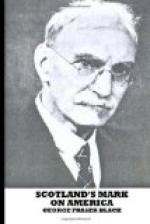and issued its famous “Pastoral Letter,”
which was sent broadcast throughout the Colonies,
urging the people to adhere to the resolutions of Congress,
and to make earnest prayer to God for guidance in all
measures looking to the defense of the country.
This powerful letter was also sent to the legislature
in every colony. Adolphus in his “History
of England from the Accession of George III. to the
Conclusion of Peace in 1783,” published in London
in 1802, declared that the Synod and their circular
was the chief cause which led the Colonies to determine
on resistance. There is no question that from
the Scots Presbyterians and their descendants came
many of the leaders in the struggle for independence,
as Bancroft has well pointed out in the following words:
“The first voice publicly raised in America to
dissolve all connection with Great Britain came not
from the Puritans of New England, nor the Dutch of
New York, nor the planters of Virginia, but from the
Scotch-Irish Presbyterians.” Joseph Galloway
(1730-1803), the Loyalist, than whom, says Ford, “there
could be no better informed witness,” “held
that the underlying cause of the American Revolution
was the activity and influence of the Presbyterian
interest,” and further, that “it was the
Presbyterians who supplied the Colonial resistance
a lining without which it would have collapsed.”
And Joseph Reed of Philadelphia, himself an Episcopalian,
said: “The part taken by the Presbyterians
in the contest with the mother country was indeed,
at the time, often made a ground of reproach, and the
connection between their efforts for the security of
religious liberty and opposition to the oppressive
measures of Parliament, was then distinctly seen.
A Presbyterian loyalist was a thing unheard of.”
Parker, the historian, quotes a writer who says:
“When the sages of America came to settle the
forms of our government, they did but copy into every
constitution the simple elements of representative
republicanism, as found in the Presbyterian system.
It is a matter of history that cannot be denied, that
Presbyterianism as found in the Bible and the standards
of the several Presbyterian churches, gave character
to our free institutions.” Ranke, the German
historian, declared that “Calvin was the founder
of the American Government;” and Gulian C. Verplanck
of New York, in a public address, traced the origin
of our Declaration of Independence to the National
Covenant of Scotland. Chief Justice Tilghman
(1756-1827) stated that the framers of the Constitution
of the United States were through the agency of Dr.
Witherspoon much indebted to the standards of the Presbyterian
Church of Scotland in molding that instrument.




